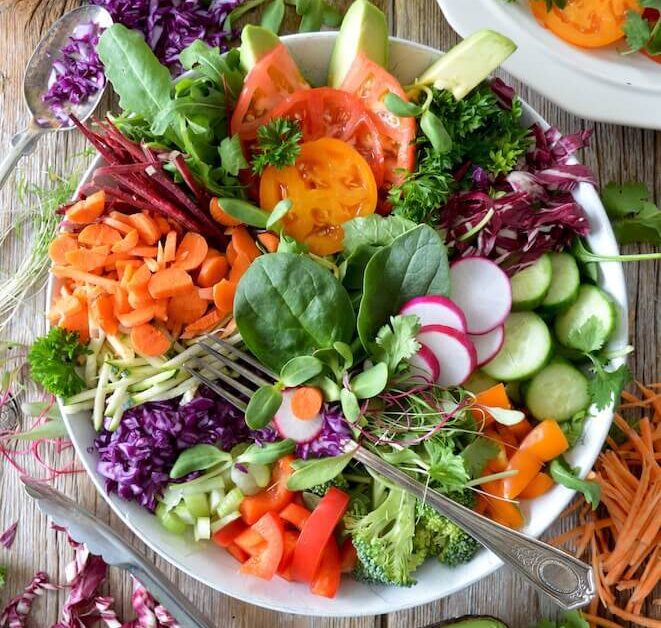Going vegan is a huge decision that one has to make. It can be challenging to achieve a healthy vegan diet during your transition. Remember, there’s more to veganism than just avoiding foods derived from animals. If you’re just starting out, check out our guide on veganism for an overview of what you need to know.
For someone trying to switch to a plant-based diet, maintaining a healthy vegan food can be challenging because you now have to ditch meat proteins and dairy products. The big question remains: How can I continue getting enough calories, vitamins, proteins, and carbs with a healthy vegan diet?
The good news is that maintaining a healthy diet as a vegan is not supremely difficult once you get the hang of things. There’s a bit of a learning curve when you’re starting out, but that’s why we made this guide: To give you the information and resources you need to start off on a healthy path.
Please note: This is not medical advice. Please consult with your medical provider before making any changes to your diet.

Educate Yourself
Easier said than done, right? But learning as much as you can about veganism and your health is crucial. Lots of rookie vegans wind up over indulging on junk food or missing out on important nutrients they used to get from animal products.
Read books, follow social media pages, ask questions. We’re lucky to be living in the age of information, which brings us to our next point:
Research online
There is a lot of information online, good and bad. Focus on strong sources like medical institutions for your primary information about how veganism can affect your health.
When you’re looking at information about which foods have specific nutrients you’re looking for, there’s great information all over the place.
Focus on Whole Foods
To the best of your abilities, you should focus on eating whole foods. There are a lot of really great vegan foods in supermarkets these days, especially in big cities, but processed meat and cheese substitutes shouldn’t be something you eat every day.
Not only do lots of whole foods contain protein, but they tend to also have other vitamins, too. For example, Gardein Chicken Tenders have protein, fat, and a little bit of iron in them. Black beans, on the other hand, contain iron, protein, phosphorus, folate, calcium, fiber, magnesium, manganese, selenium, copper, and zinc. So while there’s nothing wrong with consuming processed foods in moderation, whole plant foods will do you a world of good.
Communicate with your Doctor
Your doctor can quantifiably track your health with a number of different tests such as a blood panel, blood pressure, and screenings for various diseases. Are you getting enough iron? Is your triglyceride count high? Your doctor can test it and give you remedies for any problems.
For example, a lot of vegans find they need to take a B12 supplement. A lot of people regardless of their diet choices wind up taking some sort of vitamin or supplement to maintain optimized health. Whether your doctor suggests a multivitamin or prescribes you vitamin D, it’s very possible that you’ll find a part of your diet that can be improved.
Some doctors can have old-fashioned views on nutrition (hey, doctors are people, too!) so if your medical provider doesn’t want to budge on a meat-centric diet you can always talk to someone else. Luckily, this is getting less common as more research is done on the benefits of a plant-based diet.
Have an Open Mind and Positive Attitude
Veganism isn’t necessarily hard, but when you’re first starting out it can be. You might find yourself overwhelmed by information and fighting cravings for real chicken wings, and your energy to search for a brand new recipe to try might be wearing thin.
Persevere. You are doing something great for yourself, animals, and the planet. Take some deep breaths and remember why you’re doing this. Google “vegan positivity” or “cute animals” for some quick inspiration.
While you’re trying to be positive, stay open to possibilities. Ask anyone who’s been vegan for awhile, and they’ll likely tell you that they’ve fallen in love with foods they never thought they’d try or even hadn’t heard of before going vegan. I had no idea how versatile tofu is, and jackfruit wasn’t even on my radar. There’s so many great things that can be used in an abundance of delicious meals. Focus on the possibility instead of the restrictions.

Transitioning from a regular diet to a plant-based diet can be challenging. It requires patience and in-depth research to understand what vegan foods and ingredients can substitute animal-based foods for a healthy vegan diet. But once you’ve found a rhythm, it gets easier and easier.
Which of these tips is the most helpful for you? Let us know in the comments!










1 thought on “How to Be Healthy as You Transition to a Vegan Diet”
Pingback: Benefits of Eating a Vegan Diet for Your Health - Abroad Vegan